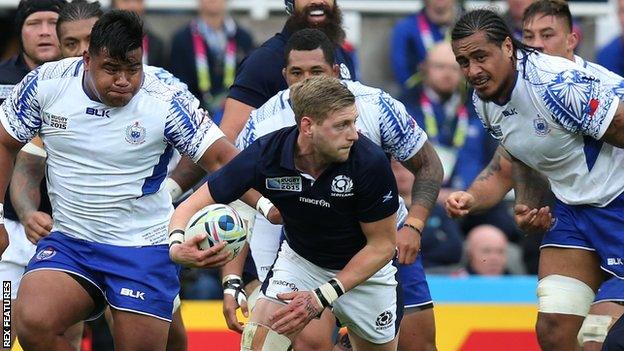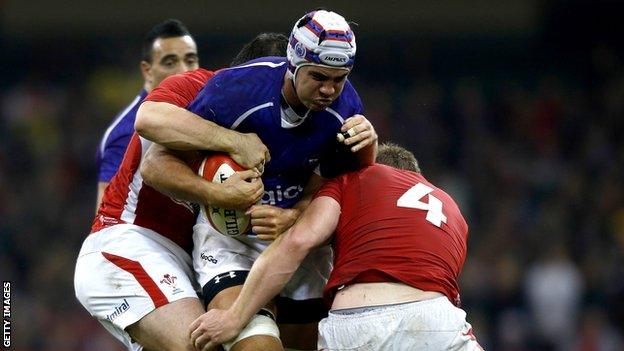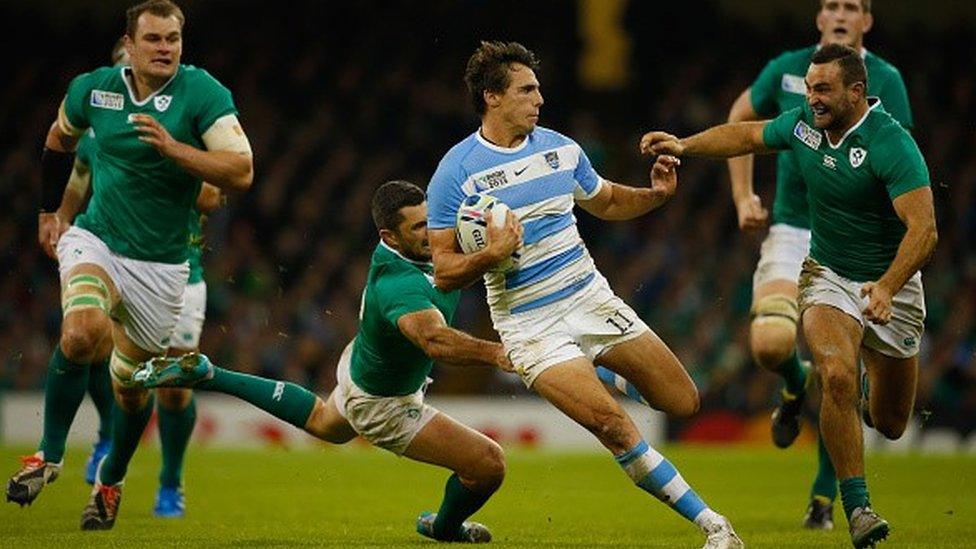Autumn Tests: Samoa rugby is bankrupt, says country's prime minster
- Published

Samoa take on Scotland on Saturday - their last meeting saw the Scots win 36-33 in the 2015 World Cup
Autumn Test: Scotland v Samoa |
|---|
Venue: Murrayfield Stadium, Edinburgh Date: Saturday 11 November Kick-off: 14:30 GMT |
Coverage: BBC One, Connected TV, online & the BBC Sport app & Radio Scotland 810MW, plus live text commentary on BBC Sport website and app |
Samoan rugby has been declared "bankrupt" by their prime minister, external before Tests against Scotland on Saturday and England later this month.
Tuila'epa Sailele Malielegaoi, who is also chairman of Samoa Rugby Union (SRU), has asked the public to donate money to keep the sport alive.
The news puts pressure on other nations - England in particular - to share revenues from games with the Samoans.
Host countries are currently under no obligation to split gate receipts.
England host Samoa at Twickenham on 25 November.
Nations haven't done enough for Samoa - Dawson
Speaking to the BBC last month, the Rugby Football Union (RFU) chief executive Steve Brown confirmed he had been approached by the SRU for funding.
The RFU intends to make a financial contribution - understood to be in the region of £75,000 - but is wary of being caught in the middle of a dispute between Samoa and World Rugby.
"We've had a letter from the Samoan Union," Brown told BBC 5 live a fortnight ago. "What's tricky about that letter is that it expresses a complex dispute that it has with World Rugby, and is linking that with a request for funding.
"One of the things we do when Samoa is here is cover all of their costs whilst they are in the country, so that will happen naturally."
English rugby has profited from players of Samoan descent playing in the Premiership, and in the case of Manu Tuilagi, for the national side as well.
And given their financial might, Brown is aware the RFU has a responsibility to look at the game as a whole.
"We know we are one of the richest unions in the world, and we have done a lot for the global game," Brown added.
"If you take the World Cup in 2015, we have generated significant revenues which were passed back to World Rugby for future investment, and that's the model.
"But we are aware some nations find their existence quite difficult, and we are always aware cognisant of that and always listen."
Asked if global rugby is not giving Pacific Islands teams a fair slice of the pie, Tuilagi said: "I think that's a question for World Rugby - they're the ones who should deal with it."
But he added: "Teams from the Pacific have got to help themselves first internally to run things properly. Money-wise is the struggle but also the people who run it can be a lot better.
"There's so much potential there if things are run properly back home."
Samoa's games against Scotland and England are not in doubt.
World Rugby - the sport's global governing body - underwrites players' insurance, and has paid all of the Samoa players' flights over to the first point on the tour. The host country then pays for the team's costs while in that country.
World Rugby says it is committed to supporting rugby in the Pacific Islands.
It has invested about £1.5m in Samoan rugby in 2017, and part of the new global calendar agreement post-2019 should see Tier One nations touring the Pacific Islands more regularly and boost revenue as a result.
'We need to run it as a business'

Flanker Daniel Leo has played 39 times for Samoa
Former Samoa back-row Daniel Leo has criticised those running the Samoan Rugby Union and urged them to run it as a business.
Speaking on 5 live's Rugby Show on Wednesday he said: "The problem is we've got people making business decisions without any professional business experience or any business nous.
"But they continuously get voted in because people are scared not to vote them in because they are powerful politicians.
"Rugby is being run as a business, that's a model that needs to be embraced in the islands. It's no longer just the game we love, it's got to make financial sense as well.
"At home we've got a capacity stadium of 10,000, and you can't charge over £10 a ticket in third world countries - the average salary per week in Samoa is under £100 a week, so it's difficult."
Speaking about the donation from the RFU to his country's rugby union, he added: "It can't just be a goodwill gesture, there needs to be some policing about where that money is funded."
Analysis
BBC Radio 5 live rugby reporter Chris Jones
The above details are the facts of the matter, but there are plenty of questions as part of a wider discussion:
Should Tier 1 nations tour the Pacific Island countries more often?
Should the RFU and other wealthier unions split the match-day revenues when they host Tier 2 sides?
Should the "goodwill gesture" be higher?
Should World Rugby focus less on cracking new markets like America and more on the Pacific Islands?
If Tier 1 nations don't have a financial obligation to teams like Samoa, should they have a moral one?
- Published7 November 2017

- Published6 November 2017

- Attribution
- Published8 November 2017
